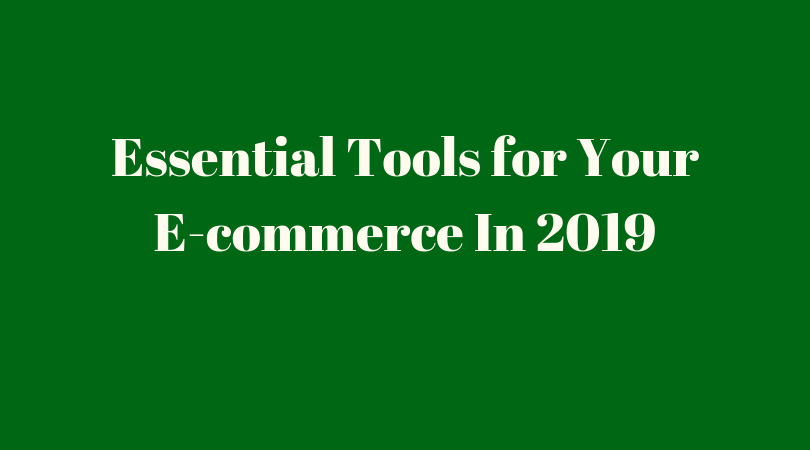Essential Tools for Your Ecommerce In 2019
The way people shop and do business on the internet keeps on advancing and changing. Social media was the best digital marketing strategy for online businesses until platforms such as Facebook started suppressing business-oriented posts, allowing users to see more posts from their followers. It is necessary to keep tabs on the market trends, and WordPress is one of the best content management system for your e-commerce site.
Manual implementation is not easy and besides, why do the work when there are thousands of tools? If you already have some of the tools listed below, be sure to upgrade to the latest version. With the following tools, you will be in a position to create a powerful e-commerce business in 2019 and beyond. We have broken them down into the three categories:
- Marketing and analytics
- Accounting and HR
- SEO
Marketing and Analytics
Online marketing is all about using analytics to create strategies that convert. There are numerous tools that have been around for a long time and have been tested. These are four of the best marketing and analytics tools for 2019.
Google Analytics
Google Analytics has been the leading analytics tool for a while now, and it helps to know how your customers engage with your business niche and brand. You can learn a lot about your customers using Google Analytics, and you will be able to set your marketing strategies along to customer behavior for increased traffic, and sales, of course.
Google Analytics also helps you gain insight into the effectiveness of your digital marketing strategies right from SEO activities, email marketing, site search, landing pages and more. This way, you will better understand your customer and their online movements, and then move down the sales funnel and make the sale.
Hootsuite
Social media is one of the best ways to push the brand to new customers. However, when you are running multiple social media platforms, it easily becomes stressful, and you need Hootsuite to manage your content marketing process, especially the ads.
Hootsuite will also open your business to anyone with an internet connection, and it is just a matter of connecting with them. Responding to customers’ direct messages and comments from your followers is easy, and you can schedule your content marketing for all your preferred social media accounts. Instagram, for example, is become a handy e-commerce marketing tool, and CMS Wire has a good article on how it will shape e-commerce in 2019.
AdRoll
A large percentage of your revenue is falling through the cracks. In most cases, the customer goes as far as adding the item to the cart and then fails to pay. As documented on Optimizely, shoppers abandon the shopping cart at least 70 percent of the time. Ads are only useful if they lead to browser conversions, and this is where AdRoll comes in.
AdRoll uses market analytics to retarget your ads to the customers who almost bought an item but did not, as well as new traffic. Another reason that you should have AdRoll on your list of e-commerce tools is that you can use it to share your ads on other platforms, including mobile and social media platforms such as Instagram, Twitter, and Facebook.
Shopify
This tool has gained a lot of recognition in the recent past, and it one of the top 10 e-commerce platforms by virtue of a number of individual users. It not only provides domain hosting services, but it also has hundreds of different e-commerce platform templates and themes that allow you to configure your e-commerce site to suit your brand identity and purpose.
It also has an excellent order fulfillment, inventory management and several sales channels that are available on the admin dashboard. On top of that, Shopify allows you to handle your marketing campaigns and track sales, as well as growth trends.
Accounting and HR
While many e-commerce businesses frown upon bookkeeping, employee payroll management, and taxation, you can use the following tools. You could try out the free version first and experience the benefits for yourself before subscribing.
QuickBooks
This is a tool that offers business analytics that aids in the management of expenses, profits, cash flow and various finance-related matters of your business. Think of it as your accountant that manages your bills and the payment of your employees. Other than this, QuickBooks also has one of the best invoicing software that helps you keep track of all your unpaid receipts, and provides you with the necessary information to follow up on your debtors.
Xero
This accounting tool is perfect for both established and startup e-commerce business. It has a wide array of features, such as inventory tracking, tax calculation, order tracking, payroll management, expense claims, and enhanced data security. It comes recommended by various leading companies in the world.
TurboTax Business
Dealing with taxes is another of the most stressful administration tasks, and TurboTax Business can help you get it done with ease. It plugs into your QuickBooks and imports your business’ financial data, which you can use to calculate your data with ease. It has a guide for industry-specific tax deductions, how to fill out the US tax return forms and more.
SEO
Search engine optimization is a crucial factor in increasing the efficiency of your site. With that said, there are so many moving parts in SEO that you cannot do them all on your own. Most of the website building platforms today have inbuilt SEO, so you do not have to do much work. Instead of getting an employee, use these tools to streamline your SEO activities for better site ranking and marketing campaigns that convert.
Google Keyword Planner
This tool helps you identify the popular keywords used in your business niche and the average number of searches for each keyword. It is an advanced version of the AdWords Traffic Estimator and Google Keyword Tool. You can set the period that you want to get the keyword volume estimates, for example, what people search for during the festive season when e-commerce sales skyrocket.
MOZ’s Open Site Explorer
This tool allows you to research anchor texts, backlinks, and potential dead links, as well as find link-building opportunities. It also provides competitor analysis, and you must be a MOZ Pro subscriber to get the full access to the Open Site Explorer. However, the free version also has a lot of useful features.
SEO Site Checkup
This tool allows you to do a complete SEO analysis of your site, and then it gives a report. It is especially useful in discovering, reporting and fixing SEO errors. It will also suggest the parts that need upgrading to increase the site’s SEO. It will offer valuable suggestions that you can use to correct the errors on your site in a few clicks.
Conclusion
There you have the essential tools for your e-commerce in 2019. You can try out the free versions first, see how well they work for you and then upgrade to the pro versions, which have more features and resources. Visit Canspace for more information on WordPress domain creation and hosting that will make your e-commerce platform an authoritative e-commerce website in 2019 and beyond.







